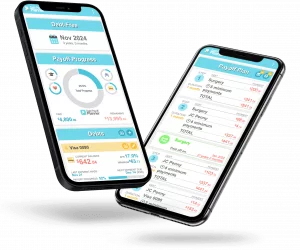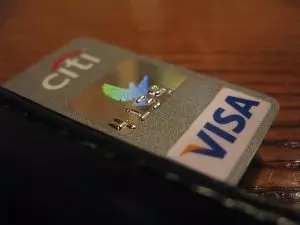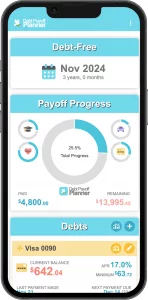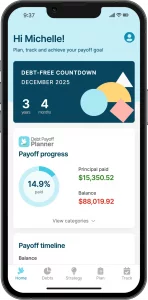Does paying high-interest rates keep you up at night? If you’re in over your head in debt, but can’t seem to get out of it, the debt avalanche may be the answer.
This aggressive, yet incredibly successful program prioritizes your debts, helping you get out of what some people call ‘toxic debt.’
If you’re looking for ways to pay off loans faster, check out the details below.
What is the Debt Avalanche Method?
The debt avalanche or ‘debt stacking’ method pays off your debts with the highest interest rates first. Unlike the debt snowball, which focuses on balances, the avalanche method focuses on interest rates.
If you’d prefer paying as little interest as possible and don’t need the ‘quick wins’ the debt snowball method offers, the avalanche method may be a good choice. You’ll pay interest down faster and focus on getting out of debt without excessive costs.
How the Debt Avalanche Method Works
If you recognize that debt is bad and high-interest rates are an opportunity cost of what your investments and/or savings could earn, you’re ready for the debt avalanche method.
Here’s how it works:
- Write down all debts in order, starting with the highest interest rate debt first (don’t pay attention to balances)
- Write down the required minimum payment for each debt
- Work the minimum payment into your monthly budget
- Pay any ‘extra money’ toward the first debt in line (the highest interest debt) in addition to the minimum payment
- Keep doing this until you pay off the first debt
You’ve started the avalanche! Paying off that first debt is a huge accomplishment because it has the highest interest costs.
Take the same amount you paid to the first debt and add it to the minimum payment of the next debt. Keep doing this to pay your loans off faster and eventually get out of debt.
Example of the Debt Avalanche Method
John has the following debts:
- $10,000 credit card at 19.99% with a $250 minimum payment
- $3,000 credit card at 15% with a $75 minimum payment
- $6,000 personal loan at 7% with a $100 minimum payment
- $12,000 car loan at 5% with a $125 minimum payment

John budgets the minimum payments and finds that after cutting expenses, he has an extra $500 per month to pay down his debts.

John pays $750 ($500 + $250) to the $10,000 credit card. It takes John 15 months to pay it off. He’s now saving 19.99% interest – you can’t get that kind of guaranteed return on any other investment!

John takes the $750 and adds it to the $75 minimum payment on the $3,000 credit card, paying it off in 3 more months!

He works his way through the debts until he’s created a debt avalanche and gotten himself out of personal debt.
The Benefits of the Debt Avalanche Method
- Understand your finances better – Focusing on the highest interest rate debt helps you understand the true cost of debt. Paying 19.99% on the money you borrowed years ago robs you of the potential for your money today. Seeing this helps you understand how to manage your money and/or stay out of debt.
- Pay less interest – Focusing on the debts with the highest interest first puts more money in your pocket. While paying the smallest debts first is motivational, it may cost more in the long run. If you can stay consistent, especially if your highest interest debt has a large balance, you’ll see greater savings.
- Pay off loans faster – Having a plan in place helps you pay your loans off faster. Instead of paying the minimum required payments, you go above what’s needed and get ahead of the balance, reducing the interest charges and overall loan costs.
Is the Debt Snowball or Debt Avalanche Method Better?
It’s an age-old question. Should you pay off the lowest balance or highest interest debt first? It’s like asking which came first, the chicken or the egg?
No two people will have the same answer.
Paying off the high-interest debt first saves you the most money. You also pay off loans faster because you’re focusing on the highest interest debts.
If you want to lower your total cost of borrowing, the debt avalanche is the best method. But, if you prefer ‘quick wins’ or need the motivation to keep going, the debt snowball is a better choice. Using the avalanche method, it could take many months before you see progress. If you’ll have trouble staying focused – use the snowball method.
If you’re a ‘numbers person’ and love seeing the interest charges drop, and know you’re on your way to financial freedom, stick with the avalanche method.
You may pay more interest with the snowball method, but if it keeps you motivated, it’s better than making only the minimum payments. Not doing choosing either method is the most expensive and time-consuming method.
The Debt Avalanche Method Gives you Control
If you can implement the debt avalanche method, you’ll feel empowered and in control of your finances. You know you’re paying off high-interest charges and will eventually get out of debt. While it doesn’t have obvious ‘quick wins’ the interest savings are huge.
If you can recognize the savings potential, the avalanche method helps you pay off loans faster. Like any new program, choose the one that you’ll use most consistently. You can change programs at any time. If you start with the snowball method and realize you can consistently pay off your debts, switch over to the avalanche method, and crush those interest charges.
Today is a great day to start getting out of debt. Choose the plan that works with your current mindset and budget and work your way out of debt for good.














